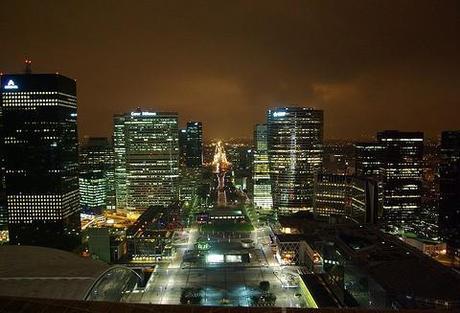
La Défense, the financial center of France. Photocredit mtoo http://www.flickr.com/photos/mtoo/5042533218/sizes/m/in/photostream/
Yes, you’ve guessed it, the financial crisis still rumbles on, like a particularly bad hangover after a week-long binge. Now the European Securities and Markets Authority, which coordinates the European Union’s market polices, has announced that short-selling stocks will be banned, temporarily, in France, Belgium, Italy and Spain, following earlier temporary bans in Greece (and Turkey, not currently part of the EU). Regulators have been discussing a ban across the Continent, as fears rose that short sells were causing panic. Britain and Germany haven’t joined the ban. The ban echoes that after the financial crisis of 2008. Nevertheless there’s been a global rally in share prices. This comes after the French bank, Société Générale, was forced to deny that it was in trouble after unfounded rumours caused it to lose 20 percent of its share price.
Many, however, think little of the ban: “The short-sale ban really smacks of desperation,” said Kenneth S. Rogoff, a professor of economics at Harvard to The New York Times. “That’s their plan for solving the euro debt crisis? I mean, this isn’t going to buy them much time.”
(You may be wondering what exactly short selling is. Well, it’s to do with selling a chicken that isn’t yours in the hope that the chicken will lose value by the time you have to buy it back. So you borrow a chicken from a chicken broker worth £10. This means you now owe the chicken broker a chicken. Then you hope there’s a run on chickens, the chicken’s now worth £4, you sell it back for that money and you’ve made £6. Bingo! Or financial turmoil. Alternatively, visit TraderMike for a slightly more complex explanation, complete with Trading Places example.)
- It’s not just a scraped knee. This ban is self-defeating, said Jeremy Warner on The Daily Telegraph. Before the collapse of Lehman brothers there was a similar ban in Britain: “Little good did it do back then, and little good will it do now.” Regulators insist the big banks are OK, and it’s the short sellers that cause problems. Look at HBOS – it claimed to be solvent, but it had to be bailed out by the taxpayer. What’s happening has got nothing to do with short selling. At best, the ban is “a sticking plaster solution” and “usually make(s) the situation even worse.” The problem is that the banking crisis “transmogrified into a sovereign debt crisis”; because sovereign bonds are assets for banks, this threatens to turn into another banking crisis, and another deep recession. We need out of this “remorseless, doomsday circularity”. We need “some form of internationally agreed burden sharing between creditors and debtors.” But that’s not on the cards.
- Growth and debt at the same time. How did we get into this mess? asked Derek Thompson on The Atlantic. Well: “There is growth crisis in the United States. There is a debt crisis in Europe. And there isn’t a single government that knows how to solve either.” The past few weeks have told us that the crisis never went away. In America, unemployment stayed above 9 percent; there was a credit-downgrade and a terrible week in the stock market. Big companies are moving away from America and not hiring Americans. “We never extracted the poison of the recession.” There’s the shadow of the mortgage crisis, which has wiped the value of homes, which “creates a negative feedback loop.” The government’s run out of options, as low interest rates and quantitative easing have had little impact.
- Hooray! Someone says WE’RE NOT DOOMED! And, Thompson continued, in Europe, Greece, Portugal and Italy are “profligate sloths”, whilst Spain and Ireland are “the busted housing kings.” They all face rising interest rates which could mean billions in assistance from the healthy European economies. Europe’s “rotting from the outside in,” as even Germany’s recovery is cooling. But there is good news: “we have less room to fall.” All we need is time, as “even in stalled recovery, the United States is the world’s leader in education and innovation.” It’ll take a while, but “the road leads back to growth.”
- Through the Looking Glass, and What Alice Found There. The problem is a lack of credibility, said Zachary Karabell on The Daily Beast. The Daily Mail placed a rumor that Société Générale, the third largest bank in Europe with a long and grand history, was in a terrible position, without any substantiated facts or named sources (it has since apologised). This caused a round of panic in the markets and rumours that France’s credit rating was to be downgraded. But this rumor was “stupid and unfounded”, according to the bank’s CEO. Even the ratings agencies said that France was in no danger of losing its rating. What a mess! We’ve arrived “in Looking Glass world where no one believes anything that anyone in finance-land says.” We have Lehman brothers and Wall Street to thank for that. We have a “severe truth deficit”. We need trust, to know that “executives are behaving responsibly … and that regulators are ensuring that leverage isn’t excessive and capital is.” The ratings agencies and media must be credible too. “But we do not live in that world.” We need to judge the present “on the present, not on false application of the lessons of the past.”
More on finance and economy
- Stocks rise after Fed announcement
- S&P downgrades US credit rating
- Financial Armageddon is at hand
- ECB responds to US credit rating downgrade
- Stocks plunge, agencies raided

